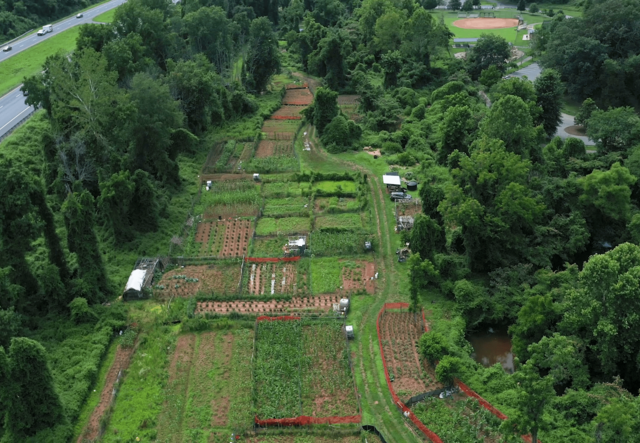
Since 2014, IRC Charlottesville’s New Roots program has provided gardening space to new arrivals and longtime neighbors alike. Refugees, immigrants, and other community members who rent and cultivate New Roots plots across the city grow healthy food for themselves and their families, save hundreds each year on their grocery bills, and build fellowship with other gardeners. The program has tremendously impacted the mental and physical health of participants. As one gardener put it, “My garden is so important to me. If the farm is good, I am good.”
That impact is exactly why IRC staff and clients leapt to address recent concerns around the future of New Roots’ flagship site, New Roots Farm. Adjacent to Azalea Park and wedged between Moore’s Creek and I-64, New Roots Farm provides three and a half acres to thirty-three households for growing vegetables and keeping chickens. The IRC had been leasing the land from farmer and Charlottesville City Market cofounder George Cason, but when he passed away in 2021, questions abounded: What would happen to the property? How many years would New Roots gardeners be able to stay? Should New Roots invest time and money in site improvements, or would they need to find a new home?
As Cason’s family reviewed options for selling the property, they entered into talks with the City of Charlottesville. Officials were interested in buying the land to expand Azalea Park. Thanks to funding from both the Virginia Land Conservation Fund and the federal Land and Water Conservation Fund, the city’s plan became a reality. Charlotteville officially purchased the land in August of 2023, giving New Roots new hope to collaboratively pursue the farm site’s future.
A crucial first step, however, involved getting input from the gardeners themselves on whether New Roots should maintain the gardens on this site or seek an alternative home due to periodic problems with flooding. An open invitation to join a steering committee went out to the New Roots Farm community, and the body began meeting in the spring of 2023 to research the land and engage their peers on this question. By July, the committee drew up potential site plans and shared these plans with all gardeners, and the multilingual community met as a whole to discuss the best path forward. Interpreters offered their assistance so that all participants could engage in an animated back and forth and share their perspectives. Eventually, these gardeners formed a consensus: Because they cherish New Roots Farm and the productivity of its land, they wish to keep gardening there for now while continuing to weigh possible alternatives for the future.
Confident in their vision for the site, New Roots staff then began talks with the city, and their efforts culminated in a July 1st meeting, where the Charlottesville City Council planned to put a final lease agreement to a vote. New Roots gardener Nar Maya Gurung testified before the council and shared moving words through an interpreter about the location’s significance in her life. “In America, we have diverse people, diverse cultures, and in the garden different people grow their own food and we are able to share,” she said. “It really makes us happy. Working in the garden and growing your own food gives peace to the soul.”
New Roots Program Manager Cecilia Lapp Stoltzfus also stood up that night to speak to officials about the garden’s impact. “Each year, New Roots engages more than one hundred refugee and immigrant gardeners, as well as countless community volunteers,” she shared. “Over the past decade, gardeners and colleagues have stewarded the health of our watershed through sustainable agricultural practices, have grown hundreds of thousands of pounds of culturally appropriate produce to infuse into our local food system, and have transformed the site into a valuable community space.”
As the evening came to a close, councilors unanimously approved the lease agreement, securing the multicultural garden oasis’s future for an additional four and half years. The final vote not only provided gardeners with certainty, but it also opened the door to many potential exciting projects. Conversations have taken root about opening a new path through the farm; about improving its gravel driveway to make the site more accessible; and about planting trees and controlling invasive species to benefit the ecosystem. Newly assured of the site’s permanence, New Roots can also begin improvements to critical garden infrastructure like fencing that will keep deer and groundhogs at bay.
“It felt like a big, deep breath of fresh air to reach the culmination of this community effort,” shared Lapp Stoltzfus in the weeks after the vote. “There’s a really strong sense of ownership among members of the farm. That night at City Council was a beautiful thing to witness.”